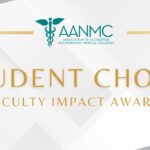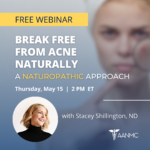While many naturopathic doctors work in private, solo practices, there is increasing demand for NDs as vital members of the health care delivery team. Interprofessional healthcare occurs when different disciplines collaborate to collectively provide patient care. Patients benefit by having the right expert advice, at the right intervention point. Improved cross-profession communication also decreases care delays, medication interactions, and promotes team members working together for optimal patient care. Naturopathic doctors are an integral part of interprofessional healthcare delivery in many types of patient care settings. We speak with several naturopathic doctors in various interprofessional healthcare settings to learn how they work to uncover the root cause of illness, coordinate care with numerous professionals, and ultimately educate and empower patients toward wellness.
One of the NDs we interviewed is Dr. Arvin Jenab, a naturopathic doctor at the Susan Samueli Center for Integrative Medicine (SSCIM) at the University of California-Irvine Health. He serves as Medical Director of Naturopathic Medicine and the Director of the Naturopathic Residency Program. He works directly with medical residents and patients and is actively involved in research and education. Dr. Jenab develops new programs to increase access to integrative medicine by underserved communities across Orange County, California.
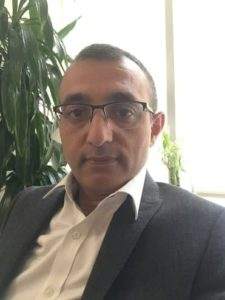
Graduate, Canadian College of Naturopathic Medicine
“Interprofessional healthcare benefits patients and doctors alike – the days of one doctor treating one condition are behind us – we have moved into an era where patients need a village of doctors and doctors need a team of colleagues! Interprofessional healthcare results in team-based, patient-centered, compassionate care. Patients feel heard and more extensive efforts and resources go into determining the cause of illness and developing the most effective treatment plan. With the complexity of chronic diseases and overwhelming number of influences that impact health, it is increasingly important to create opportunities for interprofessional healthcare whereby both patients and doctors can engage in meaningful exchanges aimed at changing the context of health.”
Uncovering the Root Cause
Naturopathic medicine is grounded in recognizing the power of identifying the root cause and limiting suppression of symptoms to only when necessary for patient safety or comfort. This is why initial visits with naturopathic doctors are likely to last between 60-90 minutes. Topics such as nutrition, digestive health, family history, stress, sleep, and mental health will be addressed regardless of the issue presented with the understanding that the body functions as a complete system, and that each of these pieces are components and contributors to overall health.
Dr. Sunita Iyer is the Clinic Director and Founder of Eastside Natural Medicine, PLLC where she and her colleagues see primarily perinatal and pediatric patients, offering midwifery care, mental health care, acupuncture, lactation management, minor surgery, and primary care for all ages. Dr. Iyer’s specialties are the Five Ps: preconception, pregnancy, postpartum, parenting, and pediatrics.
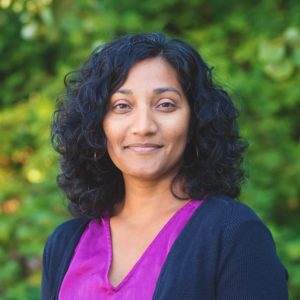
Adjunct Faculty and Graduate, Bastyr University
“When patients have each part of their body addressed by a separate health care provider, there is a presumption that health and well-being happen in isolated systems. We know this isn’t true. When working as an integrated and interdisciplinary team, we can better understand our roles, contributions, and limitations to communicate more effectively about the person we are treating rather than the systems. Patients know that we are all working toward their health together, and that when something isn’t working, we will all problem solve together.”
Dr. Tegan Moore is the Executive Medical Director and Co-Founder of WHEELHOUSE Center for Health and Wellbeing. Her practice sees a variety of patients from pediatrics to oncology who are looking for a team-based approach and personalized healing solutions for chronic illness. Dr. Moore’s team works together to provide a one-stop-shop for genomic and microbiome analysis, personalized nutrition and lifestyle interventions, acupuncture, and cognitive/behavioral health.
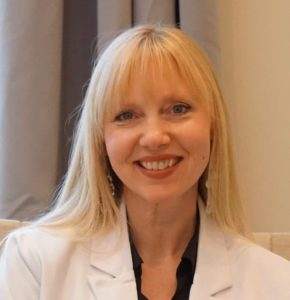
Graduate, University of Bridgeport School of Naturopathic Medicine
“Naturopathic doctors are trained to search out and address imbalances in the body that cause symptom patterns—a method of doctoring that often requires unique treatment strategies catered to the needs of the patient. This approach to treatment often stands in contrast to allopathic protocol-based treatment plans and can act to augment care plans and improve health outcomes.”
Many times, conversations with patients reveal symptoms or health issues that may have not otherwise been addressed, and can serve as a first line of defense against chronic disease, greatly reducing the need for future healthcare intervention.
Dr. Lisa Taulbee is a primary care provider who specializes in women’s health and gynecology. She works for ZoomCare, which is an on-demand interprofessional health care clinic system with specialists who are available to see patients without referrals seven days a week.
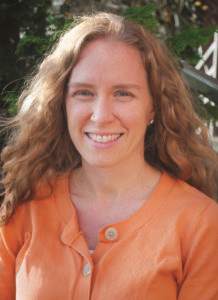
Graduate, National University of Natural Medicine
“Patients often require multiple approaches and therapies to best manage health conditions. All the providers on a patient’s care team are able to provide input in regards to their own specific areas of expertise, including naturopathic doctors. Natural therapies can augment conventional therapies and even prevent the need for conventional therapies that may have adverse risks associated.”
Dr. Jacob Wolf serves as a naturopathic provider at Lake Health Integrative Medicine, a practice which consists of osteopathic physicians, medical doctors, and chiropractors.
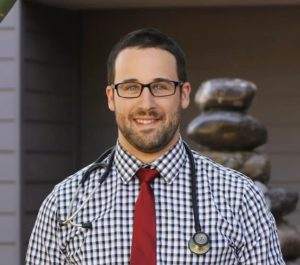
Graduate, Sonoran University of Health Sciences
“With current heavy reliance on opioids and polypharmacy, a growing number of patients are looking for non-drug alternatives that an ND can offer.”
Furthermore, “NDs are investigative diagnosticians. They take the time to gather a fair amount of information including labs and imaging, analyze and interpret based on defining and guiding principles of naturopathic medicine, develop hypotheses, and follow through with sometimes complex treatment strategies. Our uniqueness is our systems-based approach to health and disease, and our consideration of the mental and emotional factors that influence patients’ health,” adds Dr. Jenab.
Dr. Dawn Siglain specializes in autoimmune, pulmonary, and renal health at Inner Source Health in New York City. She also is trained as a Reiki instructor and acupuncturist. Dr. Siglain describes a visit at Inner Source as unlike any other doctor appointment, with an in-house variety of providers for women’s health, pediatrics, mental health, chronic pain, neurodegenerative disease, cardiovascular health and metabolic syndromes, Chinese Medicine, Lotus Physical Therapy, Pelvic Floor Therapy, and massage therapy.
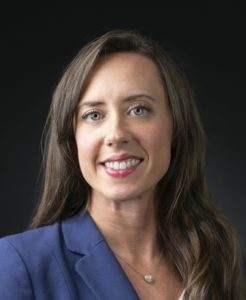
Graduate, University of Bridgeport School of Naturopathic Medicine
“Naturopathic medicine extends beyond what labs may reveal about a current physical state. Using a preventative eye, I assess labs with a narrower reference range which allows for detection of imbalance in the body before symptoms of discomfort may arise.”
Doctor as Teacher
The first step to treatment is providing patient education with medical professional insight. Naturopathic doctors take the time to explain how factors could be contributing to illness so that the whole person is treated, not just the symptoms. In doing so, naturopathic doctors may collaborate with other medical professionals to provide the most comprehensive care available. Most importantly, the patient is involved and given options in each step of the process.
Dr. Dan Rubin is a board-certified naturopathic oncologist, founding president of the Oncology Association of Naturopathic Physicians, and Medical Director at Naturopathic Specialists, LLC., where many of his oncology patients are sent to him on referral from medical doctors. His team of interprofessional healthcare providers sees patients for pain management, diet and nutrition, IV therapy, and more.
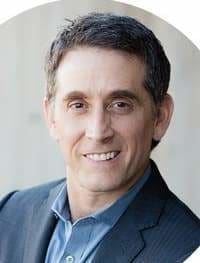
Graduate, Sonoran University of Health Sciences
“As part of an interdisciplinary team, each physician is presented with the same patient, but each physician, given their specialty, is going to see the patient a little bit differently. NDs are very attuned to identifying the cause of illness rather than just addressing the symptoms. This focus on asking “Why did you become ill?” rather than jumping straight to “do this to get better,” helps to facilitate patient education and draw attention to the patient’s accountability in maintaining their own health. It’s that vital step that makes personalized medicine and care possible.”
Dr. Heather Bautista is a naturopathic provider at Edward-Elmhurst Integrative Medicine Clinic. She works alongside medical providers to offer holistic patient care.

Graduate, National University of Health Sciences
“Simply put, interprofessional healthcare gives patients options. Being in an outpatient hospital setting, I often get statements like ‘I don’t want to go on medication’ or ‘I don’t want to be on this certain medication’ followed by ‘What can I take instead?’ It is not about replacing a medication with a supplement, but giving the patient options of what they can do at home with their lifestyle, food choices, possibly looking into environmental exposures, stress levels, detoxification pathways, etc.”
If the patient desires care outside the specialties or training of one health care provider the naturopathic doctor will make referrals to another.
Dr. Erica Joseph is a naturopathic oncologist at Seattle Integrative Oncology. In this busy practice, naturopathic doctors offer patients additional care in addressing symptoms and side effects from their treatments – a service that other providers do not have time to offer.
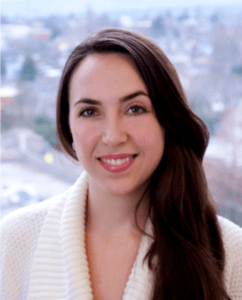
Graduate, Bastyr University
“Within the realm of oncology, each practitioner has a very specific role that they play and the different modalities can be quite separate, from radiologists who provide imaging, to surgeons who perform biopsies or curative surgeries, on to medical oncologists or radiation oncologists who provide their respective treatments. As a naturopathic doctor, I work with patients through each of these different stepping stones and help them to have a cohesive and optimal health care plan. By having the option to see multiple providers, patients gain more knowledge about their health and are given more options for treating their health conditions.”
Many times, naturopathic doctors can work with patients to incorporate lifestyle changes such as exercise, diet, nutrition, and stress management that provide a more natural approach to healing and longevity.
“From a family medicine perspective, the interdisciplinary model is priceless. Being able to see a child, and also take care of the parents, and even grandparents, provides insight not only into the symptoms in that moment; we gain a critical view of all of the social dimensions of health which often supersede the healthcare encounter in terms of effects upon a child’s or family’s health,” Dr. Iyer adds.
Interprofessional Feedback
Naturopathic doctors share the feedback that they have received about their naturopathic approach from their interprofessional team members.
Intrigued by whole-person approach
Dr. Jenab states, “My colleagues are intrigued and interested in learning more about the naturopathic approach to patient care. Specific feedback is that we are thorough, hold a lot of information in context, are effective at engaging patients, and create a therapeutic space that encourages patients to speak openly about their health including their emotions, thoughts, and beliefs.”
Open to new approaches
“As a licensed naturopathic doctor who practices in a pre-licensed state, I am always surprised by the positive feedback I get. My day-to-day interaction in my practice is with osteopathic physicians, medical doctors, and chiropractors who fully understand and appreciate the training of naturopathic doctors and value my approach to patient care. Other colleagues outside of my practice have occasionally been skeptical of treatment or diagnostic techniques that I have used, but have been open to trying new approaches,” says Dr. Wolf.
Surprised by extent of patient care
Dr. Iyer provides a different context on feedback she’s received. “I have a lot of friends who are other healthcare providers: nurse practitioners, surgeons, dentists, and physical therapists. When they heard that I am a naturopathic physician and midwife, they hesitated. They aren’t sure what that means. Do I run wild in the countryside with scissors? Am I anti-vaccine? Am I anti-medicine altogether? The way I describe my approach is as ‘natural-lite.’ Which isn’t to say that I don’t find natural therapies incredibly powerful or effective in my practice. What I mean is that my approach is very much a marriage of methods. All are welcome. Over time, I subject both natural and conventional therapeutics to scrutiny. I don’t think one side is ‘better’ than the other. I don’t think that there are sides. We live, as do our patients, in a system. For our patients to be healthy but also well-resourced, we must work within the system to get their needs met. Other providers are surprised that the naturopathic approach and the holistic approach involves the larger healthcare context of our patients, and not just using herbs or supplements to treat symptoms.”
Patient Success Stories
Naturopathic doctors share success stories of interprofessional patient care.

Graduate, Sonoran University of Health Sciences
“As a cancer specialist, I see the benefits of interprofessional healthcare firsthand. I really believe that ‘it takes a village’ when it comes to the treatment of a person with cancer. If a patient only sees one physician, there’s realistically only so much care that they can receive. By involving medical, surgical, radiation, and naturopathic oncologists, the care they receive is more rounded and the patient is well-supported; it’s a team effort to provide the best care possible. I also believe the principle that ‘iron sharpens iron.’ The interactions and experience that I’ve had with my multidisciplinary colleagues over the years has made me a better physician, and enhanced the care that I provide by expanding my own knowledgebase.”

Graduate, Bastyr University
“I am treating a patient with metastatic breast cancer who has been on a trial drug for about two years. During this time, she has had multiple joint pain, severe fatigue, as well as insomnia. We had been attributing her fatigue to treatment side effect, however upon deeper investigation we found that she was hypothyroid, likely due to the variety of treatments she has received. By improving her thyroid function, she has regained significant energy as well as improved sleep. She was also starting to develop elevated liver enzymes due to her treatment and although she has been responding well, there was concern she might not be able to continue. Working together with her medical oncologist, we were able to come up with a plan to stabilize her liver enzymes which has allowed her to continue treatment. Additionally, I provided her acupuncture, which has greatly improved her pain level and daily functioning.”

Graduate, Sonoran University of Health Sciences
“A patient came to me for acute low back pain on referral from a neurologist. His symptoms were initially concerning for a potentially emergent condition, cauda equina syndrome, but there was no evidence on MRI. Since a surgical treatment was not an option, he was referred for acupuncture. I used a combination acupuncture techniques and targeted supplements to resolve the majority of symptoms including peri-anal numbness, thigh and groin pain, and low back pain. However, he still had a “stuck” feeling in his right sacro-iliac joint when moving from seated to standing. He began a series of biweekly manipulation sessions. Additionally, he began treatment with a massage therapist available in our practice. He now has complete resolution of symptoms and is back to full function.”

Graduate, National University of Natural Medicine
“A 39-year-old female patient presented initially for an evaluation of acute abdominal pain. She was ultimately diagnosed with NSAID-induced gastritis. After questioning the patient, she revealed that her high NSAID use was due to severe dysmenorrhea from stage 4 endometriosis. She had previously desired to preserve her fertility and declined contraceptive options and hysterectomy for treatment. We initiated numerous natural therapies to help control her pain as well as counseling her on all options, including surgery. Her pain was so severe and limiting her life to such a degree that ultimately, she made the decision to move forward with hysterectomy. I referred her to a surgeon I frequently work with who was able to perform the surgery. Though it was not natural therapies that ultimately resolved her issue, I believe that having the time to try multiple options as well as counsel her on the risks associated with surgery and answer her questions as well as address her fears, she was able to make the decision that freed her from the excruciating pain she had been dealing with for decades.”

Graduate, National University of Health Sciences
With hopes of making a full recovery after a work-related back injury, my patient considered the advice of his physical therapist to start exercising and lose weight and was referred to me to help with this lifestyle change. After four months, he lost 84 pounds. This patient has started intermittent fasting with continued weight loss.

Adjunct Faculty and Graduate, Bastyr University
“One of my favorite stories is of a new mother that was in the care of a midwife at my clinic. During her care, she came to me for management of her thyroid with medication, lifestyle, and nutrition, which was very different than what her prior primary care physician was able to offer. Given the nature of my working relationship with her midwife, we were able to jointly manage her care plan, labs, and follow up. In the course of her pregnancy, she required a TDaP vaccine, which she was then able to walk right upstairs and receive with our team. After her baby was born, she was having lactation difficulties. I was able to step in to help with some botanical lactation support, she was able to see our acupuncturist for milk supply augmentation, and was able to connect with our mental health counselor and psychiatric nurse practitioner to assist with her postpartum anxiety and depression. I was able to work with both her mental health team members to offer nutritional and supplemental support, and to ensure that her treatments were synergistic, not overlapping, and certainly not antagonistic and causing harm. Most importantly, she was able receive all of this care in one place. She came in with her baby and was able to move between appointments seamlessly, with each of us shifting rooms to accommodate her while she breastfed or pumped. While there are so many stories like hers, what we have created in our clinic in terms of interdisciplinary and integrated care that holds families is an incredible experience for us as providers, and for the families that we care for.”

Graduate, University of Bridgeport School of Naturopathic Medicine
“A recent success was the complete remission of an intractable case of psoriasis that presented in the ear canals and genitals and produced chronic and constant itching and irritation that was very distressing to the patient. The team approach included naturopathic internal medicine techniques including specialized genomic analysis of the patient’s inherited gene single-nucleotide polymorphisms that were potential contributors to immune dysregulation, genomic analysis of the patient’s microbiome to address inflammation that could be contributing to the immune activation, personalized nutrition offered by our skilled nutritionist as well as process cognition sessions with our hypnotherapist to support anxiety and improve the patient’s stress management skills. I am happy to report that the patient’s skin lesions healed within six weeks after treatment began and they are still symptom free to this day!”

Graduate, University of Bridgeport School of Naturopathic Medicine
“I had a patient suffering from mental health concerns which were severely impacting his personal and work life. He wanted only all-natural treatment; however, he was taking medications to keep his mood stable. He had an appointment with his prescribing physician, but told me that he wasn’t going. I strongly advised him that it was in his best interest to go to the appointment, explain his desires to his medical doctor and continue taking the medication as prescribed. For him, naturopathic medicine could only work in conjunction with conventional medicine. With the patient’s consent, I reached out to his psychiatrist and sent him my recommendation plan for this patient’s naturopathic appointment. It was so important in this case to have continuity of care including clear communication with his prescribing physician. We were both concerned for the patient’s well-being. In addition, this patient needed the support of naturopathic medicine combined with allopathic care to achieve his optimal state of mental wellness.”
Continuous Learning and Excellence in Patient Care
Naturopathic medicine serves as a key component to interprofessional patient care. With the collaboration of health care professionals, naturopathic doctors serve as a teacher and guide in navigating patients through their healthcare options. Furthermore, interprofessional care encourages open-mindedness and continued education between providers to establish the best care possible for each unique patient.

Graduate, University of Bridgeport School of Naturopathic Medicine
“I consider myself an idealist and hold a personal vision for an integrated model of care where the naturopathic paradigm helps to inform the overall team approach. Although many integrative health settings currently offer naturopathic care as a ‘supportive’ or ‘complementary’ modality, it is my hope that the heightened interest in holistic and functional approaches to healing makes room for naturopaths to act more often as the central hub in integrated clinical settings.”
In the words of Dr. Rubin, “In the end it’s all about the medicine and supporting the patient in a positive way. Having a community of health care providers, each with their own perspective and experience, looking at one person and weighing in on what options they have while supporting and enhancing treatment is a wonderful standard of care to aspire to. In my opinion that’s how medicine should be delivered and exactly the care I would want to receive.”
Click here to find a naturopathic doctor near you in the United States or Canada.


